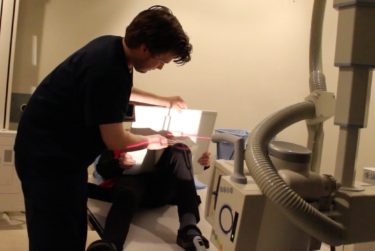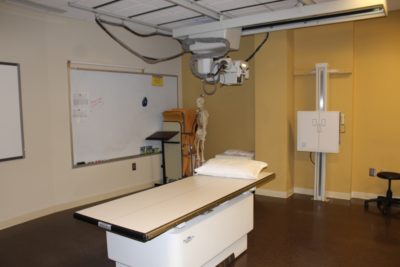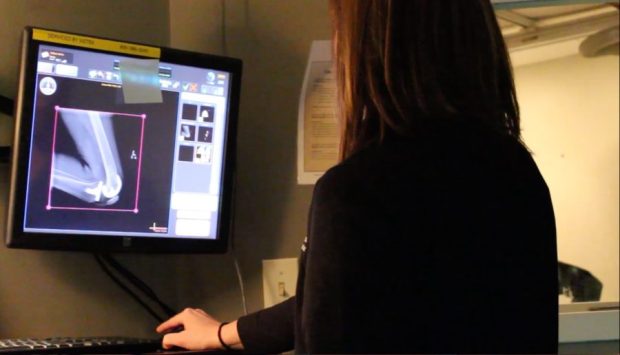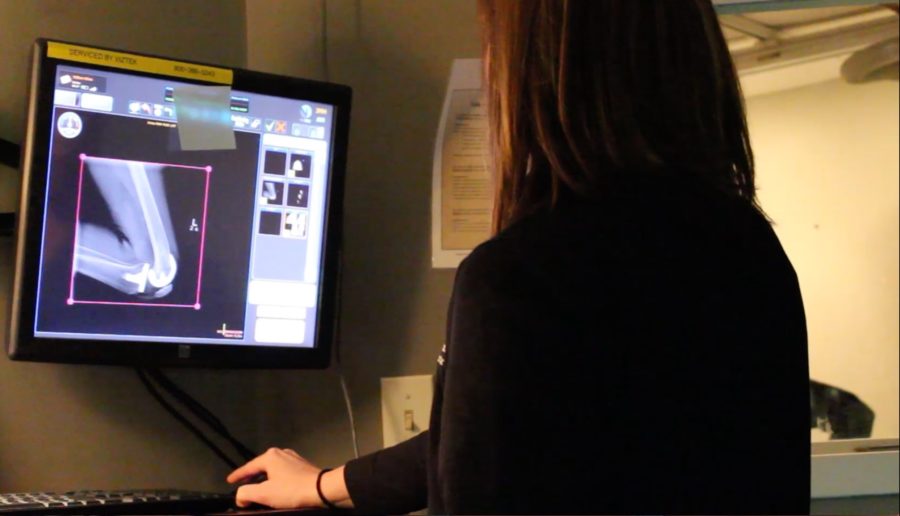Nearly everyone has undergone an X-ray or MRI, whether it’s a screening mammogram or an examination of a bone that might be broken, and demand for these tests is growing as Georgians age.
That means an excellent job market for people who have the right temperament and who are willing to earn a two-year associate’s degree and pass a state certification test to be a radiologic or MRI technologist.

“The doctor orders the X-ray and then we do the procedure,” said Neale Maddox, who manages the X-ray department at a large orthopedic practice in Athens.
After the order is made, radiologic technologists are responsible for positioning patients and capturing the highest-quality image of the area for the physicians to be able to interpret what they need. These images must be taken correctly in order for the rest of the medical process to work.
Maddox and her team, who work at Athens Orthopedic Clinic, have been trained in which views of the patient to use for each procedure.
“I think you have to be a certain type of person to work these jobs,” says Maddox. Patients “are hurting, and I think it takes compassion.”
No shortage of patients
Nationally, opportunities for radiologic and MRI technologists are expected to increase by 9 percent from 2014 to 2024, according to calculations by the federal Bureau of Labor Statistics. About 230,600 people work in the field right now, and the BLS says 20,700 jobs will be added. This is far faster than most job titles the bureau tracks.
Radiographers – another name for these skilled health workers – are employed by hospitals, freestanding imaging facilities and group practices such as Athens Orthopedic Clinic.
The good news for people looking for careers in health care is that only two years of college-level training are needed, and the median pay is close to $28 an hour, or about $58,000 annually for full-time work.
The BLS lists Georgia as having more radiographers than comparable states, with about 5,000 people working in these jobs now. But demand remains high. Websites like CareerBuilder and Indeed typically list pages of opportunities for radiologic techs in the state.

“What I’m seeing is a trend of job growth,” said Stuart Frew, who heads the radiography program at Athens Technical College. In the Athens area, “we don’t have enough graduates just to fill the spots that are opening up from now until May.”
Athens Tech’s program had 100 percent job placement last year, and its five-year average is around 98 percent, said Frew, who is also vice president of the Georgia Society of Radiologic Technologists.
As part of their education, students do hands-on training at local hospitals and clinics. These rotations frequently lead to employment after graduation.
“It’s like a job interview for two years,” said Maddox. “If you’re good, you’re going to get a job.”
Frew expects an uptick in applications to Athens Tech. “With the amount of jobs opening up and the lack of technologists to fill those,” Frew said, “we are probably going to see an increase, I would think.”
The aging of the baby boomers, the huge post-World War II generation, has created an increased demand for such technologists. That’s one factor driving hiring, but it’s not the only thing.
Changes in reimbursement are also moving some of these jobs out of hospitals and into freestanding surgery centers operated by large group practices. Maddox sees an expanding market for skilled radiographers at places like Athens Orthopedic Clinic.
Hearing about it in high school
College and career advisers, as well as recruitment events at high schools, are making teenagers more aware of radiography.
[youtube]https://youtu.be/JhwUKs1k2pM[/youtube]Maddox’s son is a high school senior, and he tells her that he often hears speakers at school talk about their work and what it takes to enter various fields.
“High schools expose more careers” to students nowadays, she said, and she’s pleased that radiography is one of these.
Frew and his colleagues from Athens Tech often speak to students in middle schools and high schools in the Athens area.
Although she doesn’t try to tell young folks what careers they should choose, college adviser Alyssa Yuhouse definitely talks to students at Clarke Central High School about opportunities in X-ray and MRI technology
Being interested in health or science in general is a starting point, but Frew and Yuhouse say that some young people have highly personal motivations.
Frew remembers hearing, “My mother had breast cancer and that’s why I want to do mammography, that’s why I want to get into this.”
Role models are also important. “Students seem to be aware that they can pursue careers in radiography,” Yuhouse said, “if they already know someone who is in that field.”
Once they enter community college, students need to complete general education classes in math, anatomy and physiology, and medical terminology. Then they must be accepted into the radiology program. A two-year associate’s degree in radiography is sufficient for most jobs, although extra training is required for radiation therapy and other specialized fields

The final step is passing a national certification exam and becoming part of the American Registry of Radiologic Technologists.
“It’s voluntary, but without it you’re not going to find a job,” Frew said.
“Hospitals are not going to hire someone without a license,” said Maddox, and neither are most large clinics. If any facility were to consider hiring an unlicensed technician, “it would likely be a small, one-doctor practice that happens to have an X-ray machine and does X-ray [work] maybe once or twice a month.”
The Georgia Society of Radiologic Technologists, along with other organizations, wants the General Assembly to approve a state licensing mechanism. Higher standards will keep patients safer and help ensure that procedures are done correctly.
“You have to have a license to cut my dog’s hair, but not to play with ionizing radiation,” Frew said, “that’s just the way it is here right now.”
Naomi Thomas is a graduate student at UGA pursuing a master’s degree and career in Journalism. She received her undergraduate degree in Media, Communication and Cultures from Leeds Metropolitan University and has an interest in health workforce stories. Her twitter handle is @nrthomas123.

